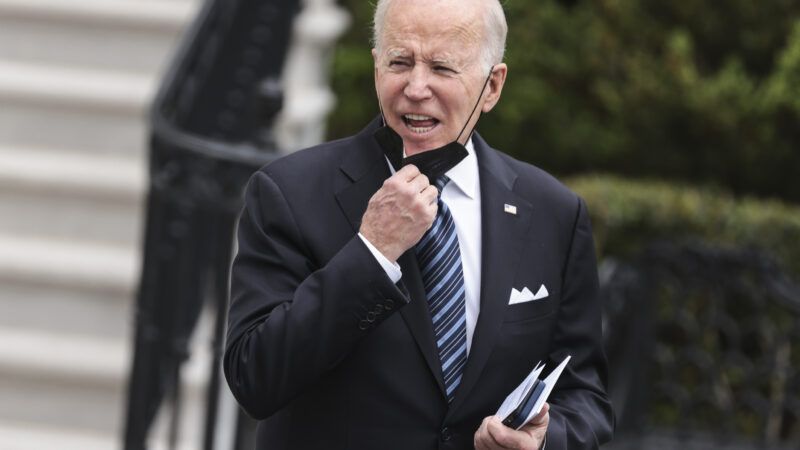Biden Says Fighting Inflation Is His Top Economic Priority. His Antitrust Policy Would Make Inflation Worse.
Attacking big firms just for being big could drive up prices.

To hear President Joe Biden tell it, "tackling inflation" is his "top economic priority." In an op-ed for The Wall Street Journal yesterday, Biden outlined a three-point plan to " transition from rapid recovery to stable, steady growth" by "[bringing] inflation down."
Yet as Reason's Eric Boehm noted, Biden's own policies, particularly the $2 trillion partisan spending bill Biden and congressional Democrats pushed through at the start of Biden's presidency, contributed to the current inflationary environment, pumping massive stimulus into the economy in an explicit bid to run the economy "hot"—despite clear warnings, even from left-leaning economists aligned with the Democratic Party, that doing so would produce harmful levels of inflation.
Indeed, even as Biden promises to whip inflation now, his administration is continuing to pursue policies more likely than not to make inflation worse despite cautions from within the Democratic establishment. In particular, his administration is pressing forward with aggressive antitrust enforcement against large companies like Amazon that would drive upward pressure on prices.
On the same day that Biden's inflation op-ed appeared, Bloomberg News reported that the Federal Trade Commission (FTC) had renewed an antitrust investigation into Amazon, focusing specifically on the company's acquisition of movie producer MGM Studios. That investigation is proceeding under an FTC led by Lina Khan, a Biden appointee who in a 2017 paper for the Yale Law Journal made a case for expanded antitrust action against the online retailer, arguing that the standard approach was deficient. Bloomberg News reports that Khan "has taken a personal interest in the probe."
Biden has encouraged Khan's zeal, and his advisers have argued in the past that more aggressive antitrust policy against large corporations can be a tool for fighting inflation. But it's hard to see this as much more than a political crutch for a flailing administration: When the price of gas began to go up, Biden urged the FTC to pursue investigations of supposedly anticompetitive oil and gas companies. When the price of beef rose, Biden urged antitrust probes into the meatpacking industry.
In December, Biden advisers admitted to The New York Times that the administration's antitrust push hadn't initially been devised as an inflation-fighting tool. Biden's initial $2 trillion spending bill, the American Rescue Plan (ARP), was best understood as a grab-bag of preexisting Democratic economic priorities ill-suited to the problems of early 2021. Similarly, Biden's antitrust push is an old partisan agenda item that has nothing to do with the problem at hand, yet has been suspiciously retrofitted into a supposed solution to current issues.
And like the American Rescue Plan, Biden's antitrust push is, if anything, likely to make inflation worse. Some of the most prescient warnings about the size and design of the ARP came from Larry Summers, a Harvard economist and one of former President Barack Obama's top economic advisers.
Summers is now warning that Biden's approach to antitrust will have similar results.
Khan's approach to antitrust is focused on discarding what has long been the legal test for antitrust actions: whether a merger enhances consumer welfare. Instead, progressive antitrust activists in the Khan mold have focused more on scale—or bigness—itself, often under the justification that limiting corporate size promotes competition with smaller firms.
But in a recent Twitter thread, Summers argued that this was exactly backward: "Policies that attack bigness can easily be inflationary if they prevent the exploitation of economies of scale or limit superstar firms," he wrote. "Likewise, policy focused on protecting competitors or communities or limiting layoffs are likely to raise costs & prices." Another way of thinking about this is that antitrust efforts that target bigness alone end up decreasing corporate efficiency since mergers and acquisitions can allow for more streamlined production processes. Reducing efficiency, in turn, drives up prices, contributing to the inflation that Biden says he's determined to fight.
In some ways, this is not surprising: Giving up on the consumer welfare standard in some sense means giving up on the idea that lower prices for consumers should be a focus. But it's telling that the Biden administration has doubled down on its antitrust policy agenda even as prices have climbed. Nothing says "fighting inflation is my top economic priority" like the continued pursuit of policies almost certain to make inflation worse.
Show Comments (36)